- Home
- Michael Buckley
M Is for Mama's Boy Page 10
M Is for Mama's Boy Read online
Page 10
“It’s been a while since I was in school, but I’m pretty sure it hasn’t been long enough for them to swap out buses for planes.”
Ms. Holiday smiled. “Actually, you’re not on a plane, Spencer.” She pointed out the tiny window to his right. He glanced over, then did a double take. Outside he could see the planet Earth. It was very far away and getting smaller by the second. Still, he would bet that people heard him screaming all the way from space.
“What is going on? Why have you shot me into space?” he said after he finally calmed down.
“Because what we have to tell you is unbelievable,” a voice said from behind him. Spencer swiveled his chair around. Behind him were the dorky kids from the coffee shop. The chubby black kid was speaking. “And we really don’t have time to explain it. Let’s just say we’re secret agents, we work for the government, this is our space jet, and we need your help.”
“You’re a bunch of—”
“Kids?” the little Korean girl with the unibrow asked. “Yeah, we get that a lot. But, again, we’re spies. The rest of it is classified, Spencer, so let us get to the point.”
The girl with the glasses and puffy hair was next. “There’s a very bad man who has invented a machine inspired by your comic book.”
“That’s crazy.”
“Don’t interrupt or I will have my friend toss you out the door,” the puffy-haired girl said, gesturing to the jittery Mexican kid, who did a strongman pose. “Now, this very bad man has already used this device to rob a bank and to damage some very powerful . . . weapons. We believe he is working for an even badder man than himself.”
“What has that got to do with me?” Spencer said. He thought he might hyperventilate at the weirdness of it all. The lady offered him a drink of water.
“You think I helped him?” he asked when he had calmed down a bit.
“No,” the little Korean girl said. “We think he got the idea from you.”
“I can’t be responsible for—”
“Mr. La Peña,” the chubby kid interrupted. “We are not accusing you of being a bad guy. We are just trying to find out how this ray gun you imagined works. The guy who built the real-life version intends to build a much bigger version, which could lead to a very big problem. If he succeeds, he and his employer could easily upset the balance of power in every corner of the world. So, again, I know this is confusing—”
“And freaky,” the Mexican kid said with a laugh.
“You kids are nuts,” Spencer cried, trying to break his restraints. “You can’t pull some silly gadget out of a comic book and make it real.”
The woman pointed at a bank of computer screens. “Benjamin, can you show our guest the footage of Albert’s robbery?”
A moment later the screens showed pictures of an obese man in a costume. His ray gun was pointed directly at the bank manager, who cowered beneath her desk.
“It’s . . . it’s real,” Spencer stammered.
“How does it work?” the girl with the puffy hair asked impatiently.
“If that guy got his ideas from my comics, I want you to be clear that I just made it all up. I’m no scientist. It’s just, well, I was reading this article about nanobyte technology in a science magazine. You know nanobytes? Those tiny microscopic robots?”
The children shared a knowing look. “We’ve heard of them,” the chubby kid said.
“There was a theory that they could use the robots for a variety of different tasks, everything from faster computers to brain surgery. I started wondering if these robots might be susceptible to computer viruses, so I thought that a cool villain might be a guy who manipulates machines by making them sick.”
“How does he do that?” the Korean girl asked.
“Again, I’m not an expert, but I did do a little research. When a computer gets a virus, it’s because it downloaded something designed to make it sick, but you can’t just download things into microwaves and cars and stuff. So how do you get the virus into the machine without the download? You send it through the air. Machine Master’s gun is really just a portable wireless connection that beams viruses into machines. The ray gun turns the virus into a radio wave and fires it. The target machine is bombarded with a virus, new information—whatever. Most machines aren’t designed to fight back. You could use this ray gun to completely reprogram anything with a processor.”
“Like hypnotizing it,” the puffy-haired girl said.
Spencer nodded. “Yeah, I guess so.”
“What kind of materials would you need to build one that could take over all the world’s machines at once?” the chubby kid said.
“That would be impossible,” Spencer said.
“Imagine it’s not,” the Mexican kid said. “Imagine you had all the money in the world, all the workers you needed, and a giant brain that could put it all together.”
“One, you would need an infrared crystal to transmit the signal.”
“Can we bring the language down to those who are still in elementary school?” the kid with braces complained from the cockpit.
“What I’m saying is that if you have ever seen a remote control, the part where the beam comes out is usually a piece of glass or plastic that directs the signal. A tiny diamond works even better. If you were going to build a huge machine, you’d probably need a big diamond to keep it stable—actually, a really big diamond. Secondly, you would need an incredible number of computer chips and processors . . . and, lastly, to affect every machine on Earth, you would have to get your ray gun high enough into orbit to hit the whole planet at once.”
“Mr. La Peña, I appreciate your time,” the puffy-haired girl said.
“Can we send him home?” the lovely woman said. “He looks like he’s had a long day.” The girl nodded.
Ms. Holiday smiled and held out her hand. Spencer took it and a tingling feeling raced through him. He’d never been near someone so pretty.
“It was very nice to meet you, Ms. Holiday,” he said. “Perhaps we could get together sometime. You know, I have an extra ticket to Comic Con.”
Ms. Holiday blushed and Spencer felt a jolt. Then he looked down and realized the woman had injected him with something, just like the kids had at the coffee shop.
“Aww man,” he said, but he was asleep before he could say anything else.
The next morning he woke up in his apartment, curled up in bed, feeling as if he had had the best night of sleep of his life. He sat up, rubbed the sand from his eyes, and felt an incredible rush of inspiration roll over him. He darted to his phone and dialed his editor at the comic book company.
“Pete, this is Spencer,” he said excitedly. “Pete, just listen to me. I have the best idea for a comic book ever! It’s about these five kids. They work for the government and they have this very hot woman overseeing them. They ride around in a rocket and . . . what am I calling it? I haven’t figured it out yet, but it’s my next project. What? Forget about the novel. Feudal China can wait!”
Albert had a routine. Every day he woke up at the crack of 2:00 PM. He would eat a breakfast of whatever fast food he had not finished the night before. Then he would take a nap.
At 4:00 he would wake and watch a series of courtroom shows featuring sassy but fair judges. He particularly enjoyed Judge Creole, who was Cajun and had a spicy personality to match. At 6:00 he would stagger out of the basement and head to the comic shop to either buy new books or just hang out. At 10:00 he would head back home to watch whatever science fiction television show he had taped and eat something that came from a can and could be cooked in the microwave.
But his whole routine was turned upside-down now that he had a job. His day started whenever the squirrels began scampering around the trees, snapping and screeching at one another, and knocking pinecones down on his head. This was usually around 5:00 AM. His mama was usually up by then preparing a breakfast of fruit, whole grain bread, and sugar-free oatmeal. It made him gag. Simon and his goon would join them, and they would talk a
bout things in the news, the weather, and their diabolical plans for crushing the spirit of everyone on the planet. Albert found it tedious. He did not feel much like socializing in the morning, let alone eating a wholesome breakfast.
Then Simon and his paid muscle, along with the squirrels, would climb out of the tree fortress and set off to rob a bank, leaving Albert alone with his mother. This was the part of the day that Albert really hated.
“I tell you, Albert. You are ten thousand times smarter than that kid. Does he really think he can rule the world? You should be in charge of this whole operation,” his mama said.
“Mama, it’s his plan and he’s paying for everything,” Albert argued.
Mama shrugged. “A waste of money if you ask me. Albert, I appreciate your loyalty but I’m just saying, if you hear someone knocking on the door, that’s opportunity.”
“Are you telling me I should betray him?”
“Shhhhhhhh!” Mama cried. “You have no idea if one of those furry little tree rats is up in the branches. I swear they understand him when he talks.”
“Mama, I don’t want to talk about this anymore,” Albert said. “You’re meddling, just like you did when I was a kid.”
“I never meddled!”
Albert was stunned. “Mama, you had your finger in everything I did. All the pushing to be a scientist. Well, here I am, a scientist, and now that’s not enough. I don’t want to take over the world. I want to save it.”
“You are so naive,” Mama said, slamming her pot of oatmeal down on the table. “What kind of money does a superhero make? Is there a retirement plan? Do you get medical insurance? Dental? Do you even get a parking space or a cubicle? We’re talking about the future, Albert! You are almost forty years old. You can either buckle down with a job that will give you control over the whole world or run around in long underwear wondering how you’re going to pay the gas bill!”
Albert frowned. His mama just didn’t understand, but that’s not what bothered him. He had been dreaming about being a hero for twenty-five years, and in only a few short days he had turned to a life of crime. Ruling the world? The thought made him shudder. Had he really sunk that low? He was no better than Two-Face or Lex Luthor. He was helping an evil genius. Simon shouldn’t have been his employer. He should have been his nemesis.
Albert pushed his disappointment from his mind and flipped on his computer. He had to get to work, and today he was on the hunt. He typed the word “diamonds” into the search engine. For the weapon, he needed enough diamonds to fill a truck.
Results came up—mostly references to the late Marilyn Monroe and an actress named Zsa Zsa Gabor. But as Albert scrolled down, he found something truly interesting. He clicked on it and found that there was a collection of giant diamonds just waiting to be snatched. But as he read further, he discovered something very uncomfortable.
“Mama, I found parts for the big ray gun,” he said.
Mama clapped. “I knew you would. How do we get them?”
“I’m going to have to learn to swim.”
Duncan stood in his bedroom, Benjamin hovering patiently around his head.
“Gluestick?” the orb buzzed. “I asked you if you wanted your usual set of clothing.”
“Yes, I know, I’m . . . thinking,” Duncan said.
“Might I ask what you are thinking about?”
Duncan studied a picture of his family that hung on the wall. They all looked so normal, except for him. “Changing my style.”
The little blue orb seemed surprised. “You have a style?”
Duncan sighed. “Benjamin, do you think I’m awkward?”
“I am aware that you and the team share a certain number of social obstacles, but as a computer it is difficult to process why that might be a problem. I’ve come to understand that you are frequently teased, but you mustn’t forget that being a nerd is a big part of your cover story. Your awkwardness keeps people from paying too much attention to you so that your duties as a spy are not hindered.”
“Oh, if we humans only thought like you—all processors and logic. But the thing is, I’ve been used to being a nerd for a while now. At school kids have been calling me a geek since I was five. It never really bothered me because I felt like I was different for a reason. I also knew that I could go home after school and be someplace where people thought I was great . . . I never thought I’d be a misfit here, too.”
The orb blinked at him.
“Tanisha says I’m not like the rest of the family. She says I don’t fit in here.”
“I’ve been told that human beings frequently say and do things they regret when they are angry. I’m sure the Creature will apologize to you soon.”
“No, I don’t think she will,” Duncan said. He’d seen her a dozen times since the incident with TJ, and she wouldn’t even look at him.
“Well, don’t make too much of it. There are plenty of people who think you fit in just fine. Still, a little wardrobe update might do you good,” the orb said.
Suddenly, rolls of fabric were unfolding out of the wall and the sounds of scissors and tape filled the air.
In no time, Duncan stepped out of his room only to walk smack into the Creature. Tanisha snarled at him, then eyed him up and down.
“What are you dressed as?” she said.
“Just trying to fit in.” Duncan looked down at his outfit. He had on a red polo shirt with blue jeans and high-top sneakers. His shirt fit and his pants went all the way down to his shoes. He looked like nearly every kid at his school. He smiled and padded down the hall into the kitchen, where his father was fighting with the toaster and his mother was enjoying some coffee. The Creature followed him.
Avery and Aiah stared at Duncan in disbelief.
“What?” Duncan said, defensively.
Aiah stammered. “You look . . . handsome.”
“Yes, Halloween has come early,” the Creature said.
Avery frowned at his daughter. “You know, when you open your mouth, sometimes very terrible things come out. We don’t talk to family this way.”
Tanisha stared at her father, then broke into tears and raced out of the room.
“Was I too hard on her?” Avery asked his wife.
Aiah shook her head. “She’s going through something. I’ll talk to her later.”
Suddenly, there was a buzz in Duncan’s nose and he sneezed.
“Is that a cold or a mission?” Aiah asked.
“I need a ride to school,” Duncan said. “As fast as we can get there.”
Two hours later Duncan stood shivering in his short-sleeved polo on the deck of the S.S. Julia Child staring at a submersible. He had seen similar crafts in documentaries about seafloor exploration, but had never seen one up close. The podlike submersible had a half-globe window made from superstrong transparent plastic and two circulating fins that moved the machine through the water. There were dozens of high-powered lights attached to the outside, as well as half a dozen cameras that could catch images in every direction.
“Hello, agents,” a tall, thin man said as he stepped onto the deck. His bald head and skin like charcoal made him an intimidating figure, and everyone stopped what they were doing and gave him their full attention.
Agent Brand greeted the man with a handshake. “It’s an honor to meet you, Captain Blancard, or may I call you Agent Fishhead?”
Captain Blancard smiled. “It’s been a long time since anyone has called me that.” He laughed. “I think Adrian will do just fine.”
Ruby was sporting a rare smile. “He was a member of NERDS back in the 1970s,” she informed her team. It was clear she felt she was in the presence of a rock star. “Fishhead was an amazing spy.”
“Why is he here?” Jackson asked. “I thought they retired us when we turn eighteen.”
“We keep a few agents on retainer when they go into a line of business that can be helpful,” Ms. Holiday explained. “Captain Blancard has gone on to be one of the world’s preeminent deep-sea exp
lorers.”
“Let’s be honest, children. I’m a treasure hunter, and a very good one at that,” Blancard said as he smiled at Ms. Holiday.
He turned and gestured at the submersible. “Some might even call me a pirate. But, I ask you, did a pirate ever have such wonderful machines?”
“Sir, I’ve never seen a submersible with arms,” Jackson said.
Ruby cocked an eyebrow. “You know about submersibles?”
“I’m not just a pretty face, you know,” Jackson said.
Blancard laughed. “You are right, my friend. Not a lot of submersibles have robotic limbs, but they are useful for picking things up off the ocean floor, and I have found that in the briny deep there are things lurking that might enjoy taking a bite out of you. Some of those things are very, very big. I had these arms designed so I could fight back. Allow me to introduce you all to your vessel, the Muhammad Ali. Floats like a butterfly but stings like a bee.”
He pushed a button on a control pad and the two mechanical arms went into action, shadowboxing the air, until coming to a rest.
“Awesome sauce!” Flinch cried.
“I call dibs on the fighting arms,” Matilda said.
“Yes, the Ali’s a fighter, and strong. Has a shell made from titanium and a Plexiglas window shield that can resist nearly a hundred times the pressure of the surface.”
“What’s the plan, boss?” Ruby asked Brand.
“I’ll leave that to our information specialist,” Brand said as he gestured to Ms. Holiday.
“We’re three miles above the wreck of the Bom Jesus, a Portuguese trading ship that is rumored to have sunk here two hundred and fifty years ago. Among its cargo were silk, spices, and three tons of Portuguese gold. We also believe that the hold contains the Azreal Diamond Cache. Legend has it that the ship was hauling crates of enormous diamonds—some of the biggest the world had ever seen. Miners discovered them on the Ivory Coast and it took a hundred men to get the entire haul aboard the ship,” Ms. Holiday said, then turned to Captain Blancard. “Most people believe the diamonds are a myth.”

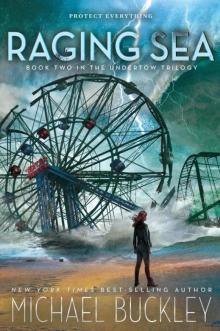 Raging Sea
Raging Sea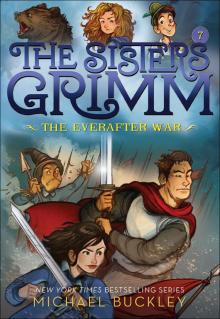 The Everafter War
The Everafter War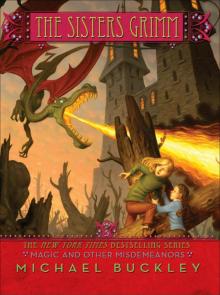 Magic and Other Misdemeanors
Magic and Other Misdemeanors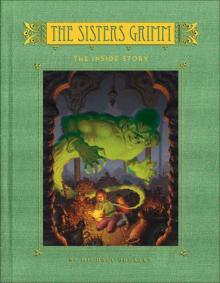 The Inside Story
The Inside Story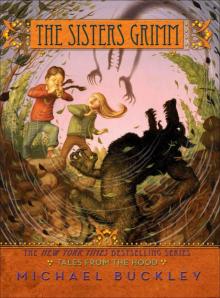 Tales From the Hood
Tales From the Hood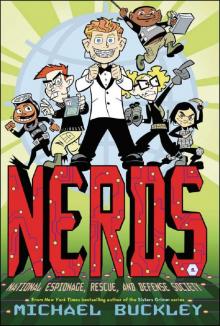 NERDS: National Espionage, Rescue, and Defense Society
NERDS: National Espionage, Rescue, and Defense Society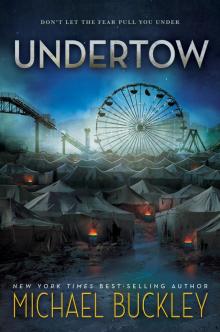 Undertow
Undertow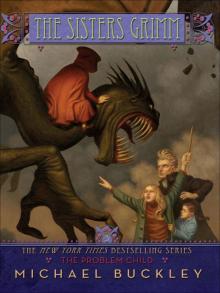 The Problem Child
The Problem Child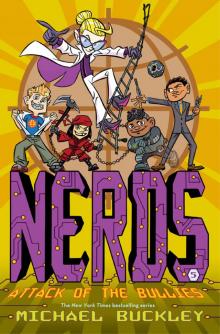 Attack of the BULLIES
Attack of the BULLIES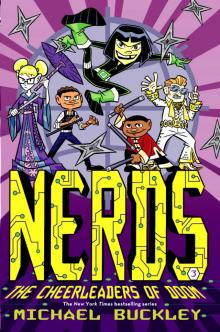 The Cheerleaders of Doom
The Cheerleaders of Doom Heart of the Storm
Heart of the Storm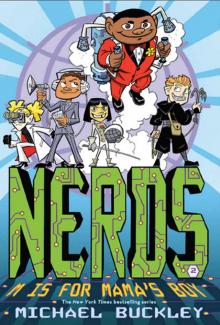 M Is for Mama's Boy
M Is for Mama's Boy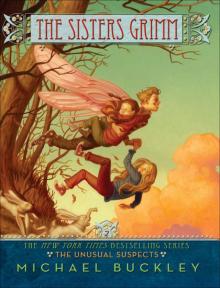 The Unusual Suspects
The Unusual Suspects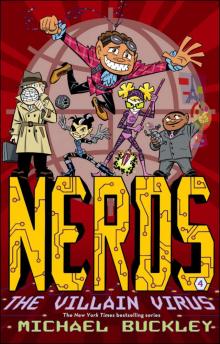 The Villain Virus
The Villain Virus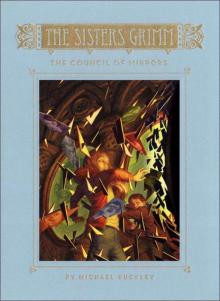 The Fairy-Tale Detectives
The Fairy-Tale Detectives The Unexpected Has Happened
The Unexpected Has Happened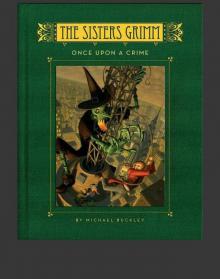 Once Upon a Crime (The Sisters Grimm, Book 4)
Once Upon a Crime (The Sisters Grimm, Book 4)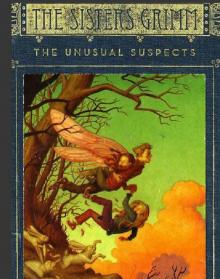 The Unusual Suspects (The Sisters Grimm, Book 2)
The Unusual Suspects (The Sisters Grimm, Book 2)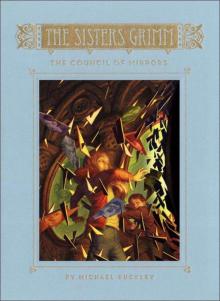 The Sisters Grimm: Book Nine: The Council of Mirrors (Sisters Grimm, The)
The Sisters Grimm: Book Nine: The Council of Mirrors (Sisters Grimm, The)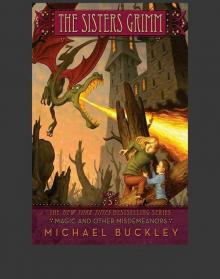 Magic and Other Misdemeanors (The Sisters Grimm, Book 5)
Magic and Other Misdemeanors (The Sisters Grimm, Book 5) The Problem Child (The Sisters Grimm, Book 3)
The Problem Child (The Sisters Grimm, Book 3)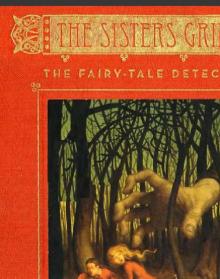 The Fairy-Tale Detectives (The Sisters Grimm, Book 1)
The Fairy-Tale Detectives (The Sisters Grimm, Book 1)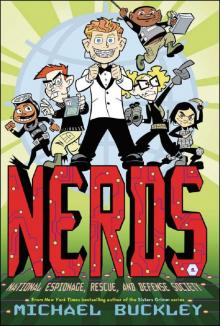 National Espionage, Rescue, and Defense Society
National Espionage, Rescue, and Defense Society